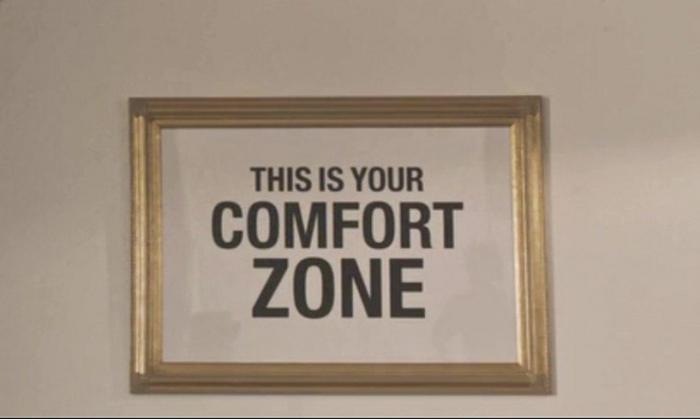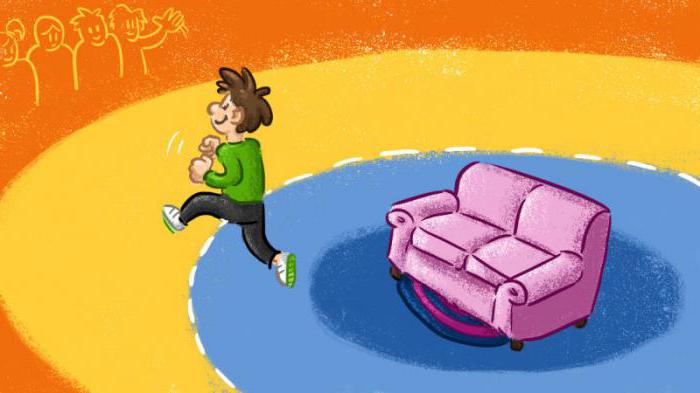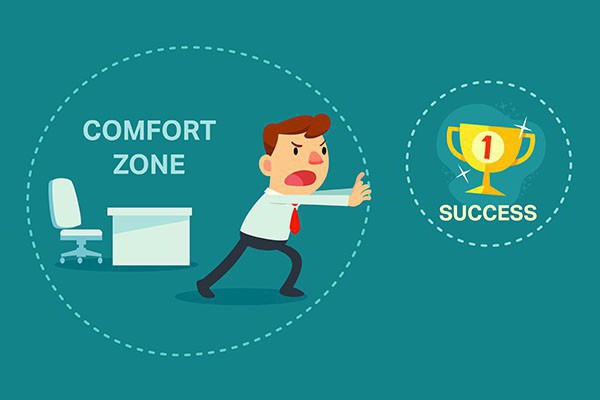All our conscious lives we are faced with the fact that we need to change something, make some important decisions, but the fear of the unknown interferes with us. We begin to convince ourselves that everything is not entirely bad, and it is not known whether it will be better there ... We are afraid of something to change seriously.
What is a comfort zone in psychology?
There are such borders within us, within which we feel good, and we feel safe. It is precisely these internal frameworks that compel us to clutch at those relationships that have long outlived themselves, at positions and work that are not only uninteresting to us, but also do not bring a normal income.
These internal boundaries create a comfort zone. Let's see what it is?
A comfort zone in psychology is an area of our living space that gives us a sense of security. Usually it is determined by habitual behavior; what you are used to is comfortable. It’s good in a world where everything is stable, familiar and predictable.
In fact, this is the state in which we feel comfortable. It would seem, well, what's wrong with that? Of course, nothing. In addition, it greatly inhibits the development of something new, unknown.
To achieve something and do something, you need get out of your comfort zone. Education is always associated with going beyond its borders.
Beyond the comfort zone, a risk zone begins. A prerequisite for the development of personality is to go beyond the boundaries of comfort.
Usually, young people are more willing to expand their comfort zone. If an ordinary person lingers in it for too long and does not do anything to expand it, then personal development stops on this, degradation begins.
Such a definition gives a clear understanding of the fact that if we are interested in development, then we will inevitably have to overcome these boundaries.
How to determine the situation for too long being in the comfort zone?
To get started, let's figure out how we understand that we are overly stuck in a comfortable zone. You will understand this by your own reaction to some new situation or circumstances. Perhaps you have only thought about her, and she already causes fear in you. I want to note that the first reaction can be very different: anxiety, stress, fear, curiosity, interest. However, it is fear that is an indicator that the comfort zone is convenient for you - you do not want to leave it.
Then there are several possible scenarios: ignore, resent, run away and hide, resist, not allowing change.
However, in order to expand its zone, it is necessary to accept everything new and adapt to it.
Awareness
Psychologists say that life begins exactly where the comfort zone ends. To get out of it, you need to understand that you have been there too long, as if suspended in this state. Until we ourselves acknowledge this fact, we will not be able to move anywhere. An important point is the very acceptance of this thought. There must be a desire, an understanding that you just need to break out of this situation.
The comfort zone in psychology covers absolutely all areas of life. This may be a relationship that does not suit us, business, unnecessary and unloved work, home, city. All this is in our usual zone, but for a long time it does not suit us, however, fearing change, we sit and do nothing in order to change something in our life.
What is a comfort zone and how to get out of it so as not to harm yourself?
Realizing that we are stuck in one place, you need to act.The list of steps to be taken can conditionally be called an action program. It is needed primarily in order to gently transition from one state to another.
The first step is the task
The primary action to overcome the internal boundaries will be the process of setting the problem. We must decide what we want to achieve, what result we need.
Suppose we realized that we were scared and uncomfortable to get acquainted with the new environment of people. So, we will need to communicate with strangers as often as possible. This will be our task. The process should become more familiar, and therefore more comfortable.
The second step is the volume of the planned result.
At this stage, it is necessary to formulate the scope of the planned result. These should be very specific figures: what and how much I want to receive, by what date. As a rule, this is an expert assessment of oneself. If you formulate an OZR, it will help to more efficiently cope with the work.
But how do you know if our comfort zone has expanded? Naturally, the criterion for success will be your peace of mind when making new acquaintances. In this case, the volume can be formulated as the number of new people in the environment. And at the same time, we denote the number of acquaintances per day. In general, it is logical to gradually increase volumes within reasonable limits. Even if all this does not immediately lead to a comfortable state, there will still be a positive effect.
The biggest trick in this case is that your attention switches to doing certain work, you do not focus on the process of getting out of an established state. A comfort zone is something to work on, it won’t come on its own.
The third step is work.
Work is nothing more than the gradual passage of all the steps outlined. First of all, we planned a program of activities for every day, our task is to follow the planned path. It will be good if you write reports on your daily activities, while analyzing the result and the process itself.
The fourth step - and again work
Yes Yes. We were not mistaken ... Work again.
I would like to note two nuances. Firstly, in order to expand the comfort zone, you must certainly work.
Secondly, it should be carried out sequentially with a gradual increase in volumes. This should not be forgotten.
Knowing what a comfort zone is and how to get out of it, people often make attempts to jump immediately to the step that they want to achieve. And for someone this can even work out, but for the greater mass it will end in the fact that they will not leave their comfortable state at all, fearing mistakes. That is why it is important to gradually adapt to the new expanded zone.
A new habit, as a rule, is fixed exactly twenty one days. To learn something new is also a kind of expansion of the zone.
We must make sure that we feel comfortable in an ever-increasing volume, then we will not be at risk of destroying absolutely all the results of our work. Every little step should be comfortable.
The fifth step is the development of a new territory
At this stage, the comfort zone is already a mastered new territory. You can relax and enjoy life. Not forgetting that new territories and victories await ahead.
Exercises and Training
If a person is afraid of something, then he must certainly do it, such is the opinion of many psychologists. Having determined what a comfort zone is, and once expanding it, we must develop the habit and ability to get out of it correctly in any situation. And for this, the fear of something new should be overcome.
There are special exercises for these purposes:
- You need to start by changing the usual little things. For example, change the schedule of the day, take another route, make purchases in a new store, or purchase unusual products.
- Getting to know a new person is a great way out of a comfortable state.
- Then you can learn something that you previously did not know how to do.Embroider, knit, cook a new dish, play the guitar.
- Watch a movie or read a book in a genre uncharacteristic for you.
- Go on an unplanned trip, everything should be impromptu, without any preliminary preparations. You will get many new experiences, and expand the comfort zone.
- Visit a new place. For example, a new restaurant with an unusual cuisine for you.
- Put on new things, those that you would not dare to wear before. It can be extraordinary styles, colors.
- Then you can do the rearrangement of furniture. Refresh your room with a new interior.
- Take a minibus along a previously unfamiliar path.
- And finally, think up your simulators - situations.
Brian Tracy
In psychology, the name of Brian Tracy is widely known. He is considered a global expert in the field of success. He developed his system to achieve it, and did so at the age of twenty-five. Since then, Tracy has written many books on psychology. He continues to work and is currently conducting trainings and consultations.
What else is Brian Tracy famous for? The comfort zone is one of the topics on which he worked. His book “Get Out of Your Comfort Zone” is entirely devoted to this topic. In it, he talks about twenty-one ways to increase personal effectiveness. Of course, his works deserve attention.
Instead of an afterword
Speaking of a comfort zone, they do not mean external circumstances that are convenient for a person, but mean internal life boundaries, in which people feel safe. A sofa, massage, coffee give a feeling of comfort for one person, and another, who is not used to it, can lead out of a zone of calm. All these objects are alien to him.
The state of comfort is not always helpful. People tend to get bogged down in unnecessary circumstances and relationships, but, out of habit, they feel quite comfortable and do not risk changing something in their lives, fearing that these changes will not lead to anything good.
Beyond the boundaries of the comfort zone is the risk zone, possible tests and dangers. Not everyone is consciously ready to give up familiar comfort and get into unpleasant conditions. However, only in this way can a person develop. He certainly needs to periodically leave the comfort zone, only he needs to learn to do it right without harming himself. Gradually expanding the zone for himself, he will certainly be in it. You can’t be uncomfortable all the time. Having learned to adapt, a person is easier to master new areas of activity. Exiting the comfort zone is useful; it is a kind of shake-up and an incentive for further actions and development.






